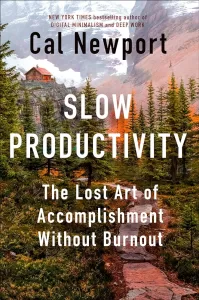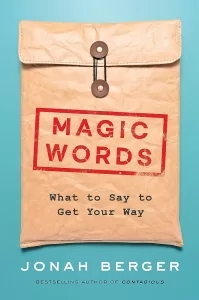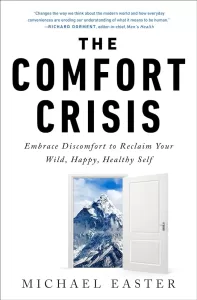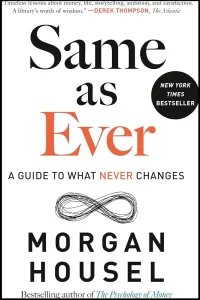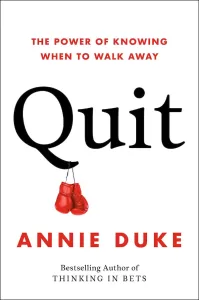Book Review: “Slow Productivity”
Book: Slow Productivity by Cal Newport
Reviewer: Bobby Powers
My Thoughts: 8 of 10
Newport has done it again with this great companion volume to his earlier book Deep Work. Whereas Deep Work talks about eliminating distractions and focusing on what matters most, Slow Productivity helps readers disregard the myth that "hours worked equals work completed" which began in the industrial age (because it was largely true at that time). Newport makes a compelling case that the best way to be truly productive is to bite off less and work at a sustainable pace.
What I Learned from the Book
Don't let the world tell you how to work. Many of us in "knowledge worker" positions are given significant freedom and flexibility over how, where, and when to work, but we still fall prey to the illusion of pseudo-productivity: "using visible activity as a crude proxy for actual productivity."
As Newport reveals, most real work isn't accomplished that way. It's accomplished by exerting focused attention on a limited number of meaningful initiatives.
Newport's definition of SLOW PRODUCTIVITY = A philosophy for organizing knowledge work efforts in a sustainable and meaningful manner, based on the following three principles:
1) Do fewer things
2) Work at a natural pace
3) Obsess over quality
Selected Quotes & Ideas from the Book
The Anti-Productivity Trend
- During the COVID pandemic, Newport began to hear anti-productivity comments from many of his readers:
- "Productivity language is an impediment to me." -Reader comment
- "The productivity terminology encodes not only getting things done, but doing them at all costs." -Reader comment
- "The fact that productivity = widgets produced is, if anything, clearer during this pandemic as parents fortunate enough to still have jobs are expected to produce similar amounts of work while caring for and educating kids." -Reader comment
- "As I soon discovered, this growing anti-productivity sentiment wasn't confined only to my readers. Between the spring of 2020 and the summer of 2021, a period spanning less than a year and a half, at least four major books were published that took direct aim at popular notions of productivity:"
- "We are overworked and overstressed, constantly dissatisfied, and reaching for a bar that keeps rising higher and higher." -Celeste Headlee
- "Knowledge workers were exhausted—burned out from an increasingly relentless busyness. The pandemic didn't introduce this trend so much as push its worst excesses beyond the threshold of tolerability."
- "Perhaps knowledge workers' problem is not with productivity in the general sense, but instead with a specific faulty definition of this term that has taken hold in recent decades."
The Rise and Fall of Pseudo-Productivity
- The Myth of Pseudo-Productivity: "'Work' is a vague thing that employees do in an office. More work creates better results than less. It's a manager's job to ensure enough work is getting done, because without this pressure, lazy employees will attempt to get away with the bare minimum."
- "For all of our complaining about the term, knowledge workers have no agreed-upon definition of what 'productivity' even means."
- "It's hard to overemphasize how unusual it is that an economic sector as large as knowledge work lacks useful standard definitions of productivity."
- "Without concrete productivity metrics to measure and well-defined processes to improve, companies weren't clear how they should manage their employees...It was from this uncertainty that a simple alternative emerged: using visible activity as a crude proxy for actual productivity."
- "If you can see me in my office—or, if I'm remote, see my email replies and chat messages arriving regularly—then, at the very least, you know I'm doing something. The more activity you see, the more you can assume that I'm contributing to the bottom line...As the twentieth century progressed, this visible-activity heuristic became the dominant way we began thinking about productivity in knowledge work."
- "In the absence of more sophisticated measures of effectiveness, we also gravitate away from deeper efforts toward shallower, more concrete tasks that can be more easily checked off a to-do list."
Slow Productivity
- The Slow Productivity philosophy "rejects busyness, seeing overload as an obstacle to producing results that matter, not a badge of pride. It also posits that professional efforts should unfold at a more varied and humane pace, with hard periods counterbalanced by relaxation at many different timescales, and that a focus on impressive quality, not performative activity, should underpin everything."
- "Slow productivity doesn't ask that you extinguish ambition. Humans derive great satisfaction from being good at what they do and producing useful things. This philosophy can be understood as providing a more sustainable path toward these achievements."
- "Slow productivity supports legacy-building accomplishments but allows them to unfold at a more human speed."
1) Do Fewer Things
- "Strive to reduce your obligations to the point where you can easily imagine accomplishing them with time to spare. Leverage this reduced load to more fully embrace and advance the small number of projects that matter most."
- "This lesson, that doing less can enable better results, defies our contemporary bias toward activity."
- "In knowledge work, when you agree to a new commitment, be it a minor task or a large project, it brings with it a certain amount of ongoing administrative overhead: back-and-forth email threads needed to gather information, for example, or meetings scheduled to synchronize with your collaborators."
- "As your to-do list grows, so does the total amount of overhead tax you're paying."
- "In a factory, pushing employees to work longer shifts might be directly more profitable. In knowledge work, by contrast, pushing employees into larger workloads can decrease both the quantity and quality of what they produce."
- Tactical Tips:
- "I recommend, at first, when considering a new project, you estimate how much time it will require and then go find that time and schedule it on your calendar. Block off the hours as you would for a meeting...The power of this approach is that you're dealing with the reality of your time, not a gut feeling about how busy you are at the moment."
- "When it comes to expending efforts on important, bigger initiatives, stay focused on just one target per day."
- "Avoid task engines [projects that generate numerous urgent small things to do]...When selecting new projects, assess your options by the number of weekly requests, questions, or small chores you expect the project to generate. Prioritize options that minimize this number."
2) Work at a Natural Pace
- "Don't rush your most important work. Allow it instead to unfold along a sustainable timeline, with variations in intensity, in settings conducive to brilliance."
- "The pace at which [great scientists and creators] toiled on their momentous discoveries seemed, by modern standards, to be uneven, and in some cases almost leisurely."
- Copernicus's revolutionary idea about planetary motion
- 1496 = Initial insight
- 14 years later = He drafted his ideas
- 30 years later = He published his masterwork On the Revolutions of the Celestial Spheres
- Isaac Newton's laws of pendulum motion
- 1655 = Initial insight
- 15 years later = He felt like he fully grasped it
- 15 years later = He published his theories
- Lin-Manuel Miranda's play In the Heights
- 2000 = First college performance of the show
- 4 years later = Submitted the play to a national music theater program
- 3 years later = First professional stage debut
- 1 year later = Broadway debut
- "The great scientists of past eras would have found our urgency to be self-defeating and frantic. They were interested in what they produced over the course of their lifetimes, not in any particular short-term stretch...they didn't feel pressure to be maximally busy every day. They were instead comfortable taking longer on projects and adopting a more forgiving and variable rhythm to their work."
- "It's true that many of us have bosses or clients making demands, but they don't always dictate the details of our daily schedules—it's often our own anxieties that play the role of our fiercest taskmaster."
- Tactical Tips:
- "Double your project timelines...If you instead give yourself more than enough time to accomplish your objectives, the pace of your work can fall into a more natural groove."
- "Apply the heuristic of reducing whatever task list you come up with for a given day by somewhere between 25 and 50 percent."
- "Implement a 'one for you, one for me' strategy. Every time you add a meeting to your calendar for a given day, find an equal amount of time that day to protect. If I schedule thirty minutes for a call on Tuesday, I'll also find another thirty minutes that day to block off on my calendar as protected for myself. As a given day starts to fill up with appointments, it also fills up with protected blocks, making it increasingly harder to add something new."
3) Obsess Over Quality
- "Obsess over the quality of what you produce, even if this means missing opportunities in the short term. Leverage the value of these results to train more and more freedom in your efforts over the long term."
- "Quality demands that you slow down."
- "In the moment, everything seems important...Even in knowledge work, however, if we look closer, we can often find hidden among our busy to-do lists one or two core activities that really matter most."
- "Deciding what not to do is as important as deciding what to do." -Steve Jobs
- Tactical Tips:
- Get together with a group of like-minded peers to review each other's work, provide feedback, and hold a high quality bar
- "Give yourself enough time to produce something great, but not unlimited time. Focus on creating something good enough to catch the attention of those whose taste you care about, but relieve yourself of the need to forge a masterpiece."
- "Don't haphazardly quit your job to pursue a more meaningful project. Wait instead to make a major change until you have concrete evidence that your new interest satisfies the following two properties: first, people are willing to give you money for it, and second, you can replicate the result...Once you've passed these thresholds, however, take action."
Think you’d like this book?
Other books you may enjoy:
Other notable books by the author:
Want to become a stronger leader?
Sign up to get my exclusive
10-page guide for leaders and learners.
